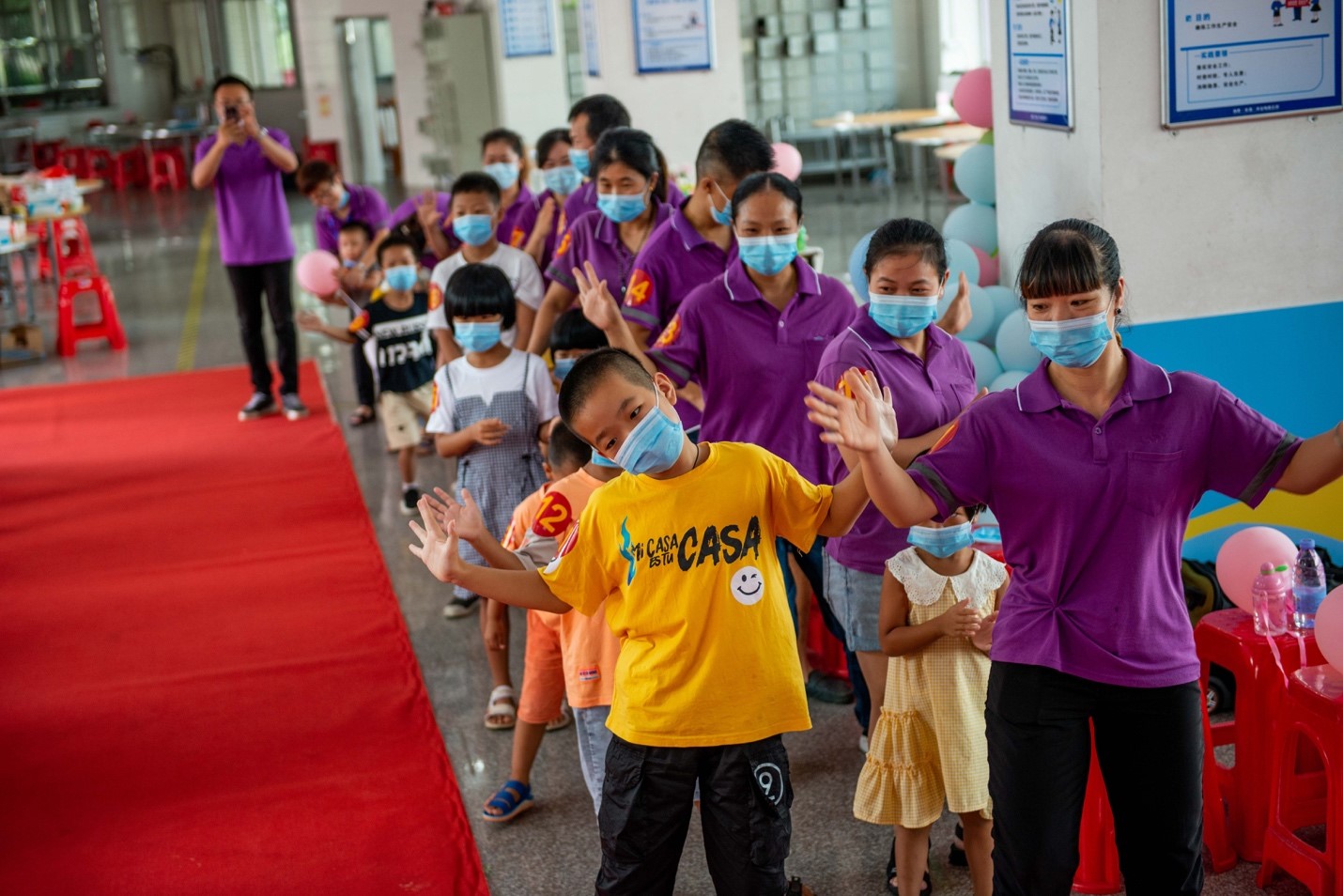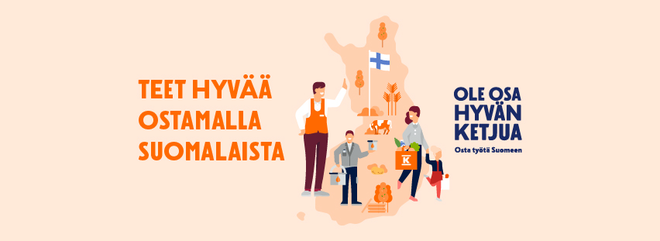

Viewpoints
Viewpoints is a blog in which different writers express their views and opinions on current topics. A new blog post is published about once every four weeks.
You can propose texts by e-mail to viestinta@kesko.fi. The maximum text length is 2,000 characters.
Ellen Schliebitz: From Crisis to Clarity: Working to Support Supply Chain Workers & their Families in the Year of COVID-19
Behind every product that lands in your home, there’s a story. Stories of parent workers determined to build a brighter future for their children, even when it means only seeing them once a year. Stories of young people leaving home for the first time to work. Stories of families working in fields or in their homes, contributing to a long chain of processes that become part of the products we use every day.
Supply chains have without doubt created countless employment opportunities across Asia, but while so many workers rely on supply chains for their livelihoods, the same can be said for the businesses that depend on their labour.
COVID-19 has turned everything on its head. As supply chains ground to a halt, workers were left in limbo: no income, no schools, no childcare, no social security, no support.
Since the outbreak began, CCR CSR has been regularly reaching out to workers in its Asian project countries to understand how the pandemic is affecting them and to find ways to address their struggles.

We have heard stories of families from China to Bangladesh having to cut nutritious food from their diets. We’ve heard stories of families falling into debt just to pay for basic life necessities such as in Indonesia where many rattan farmers have been incomeless since March. We’ve heard of parents worried about their children’s education and future, such as in Myanmar where some families didn’t have WI-FI or smart devices to access online schooling and education support. We’ve heard of children not going back to school so that they can work to support their families and parents suffering from anxiety and depression because of the uncertainty of it all.
But nine months after the pandemic began, we’ve gained an important thing: clarity. We see that supply chain workers are extremely vulnerable and have no safety nets. We also see that the line between children staying in school and engaging in child labour is extremely thin – one crisis and they may be pushed into a life of low-paid labour. But we also see that some companies are willing to support supply chain workers, despite an uncertain year.
CCR CSR works with a growing list of major brands and retailers, spread across multiple business sectors, to support parent workers, families and children in supply chains. In response to COVID-19 we’ve adapted our existing programmes to create long-term, scalable change in areas most needed, providing support in key areas including child labour prevention, youth development, the creation of family-friendly workplaces, migrant parent support and more.
A case in point are the 53 factories in China and Turkey that are engaging with CCR CSR to create family-friendly workplaces. In addition to embracing elements such as youth development, migrant parent training, responsible recruitment, some of those factories opted to open child friendly spaces within their premises in the summer of 2020. Because workers’ children had a safe space to play, workers did not have to quit or take time off and they could focus on work better.
CCR CSR is also delivering training programmes which strengthen workers’ parenting skills and equip them with other skills to help them stay safe at work and protect their families through COVID-19. Many of these factories that have implemented these programmes have become well-known in their local communities and are coveted places to work. They’ve also been able to leverage their status as a family-friendly employer to enhance their reputation and become attractive partners for buyers to work with.
As we head towards a new year – one designated by the UN as the “Year for the Elimination of Child Labour” – we have been given the opportunity to do things differently and when a company is ready to embrace that change, we will be there to support them.
Ellen Schliebitz
Director of Communications, CCR CSR
To find out more about how CCR CSR works with business to advance child rights, please visit www.ccrcsr.com. Follow us on Twitter, Linkedin and Facebook for regular updates and news.
Kesko is a member of the Center for Child Rights and Corporate Social Responsibility (CCR CSR) organisation. In 2019, Kesko opened a summer day care facility for the children of migrant workers at a site lighting factory in China, in cooperation with CCR CSR. This was part of the CCR CSR’s Child-Friendly Spaces (CFS) initiative, which enabled the children of migrant workers to spend the summer with their parents by offering them day care close to the factory.
Liisa Rohweder: The 2020s: a decisive decade for the environment
Biodiversity means the wide variety of species and biotic communities on the Earth. Even though many indicators of sustainable development have moved in the right direction during the last few decades, the graphs describing the wellbeing of nature are still declining.
The situation is alarming: According to the WWF Living Planet report, vertebrate wild animal populations have shrunk on average by 68 per cent from the 1970s to 2016. The Intergovernmental Science-Policy Platform (IPBES) has estimated one million species of flora and fauna threatened by extinction. This is a global wave of extinction, which, for the first time, is caused by humans.

But how did we end up in this situation? As pessimists like to say, promises are made to be broken. Even though I’m a true optimist, the saying seems to have some truth to it at times. A large number of international agreements have been concluded to protect the environment. Many of them state that their ambitious goals will be reached by 2020.
We have reached 2020, and I have some bad news to share: many of those goals will not be achieved this year. Overfishing continues in the EU area, biodiversity is still in decline, and 17 per cent of the Earth’s land area will not be protected by the end of the year. The promises have been broken, as the loosely formulated agreement texts have provided the opportunity to do so.
In the coming years, many agreements that were signed to protect nature will be rewritten, and therefore we are living in exceptionally important times. For example, the UN Convention on Biological Diversity, which will be renewed next year, must be made considerably more binding in order to stop the loss of biodiversity. As regards combat the climate crisis, decisive steps will likewise be taken at the Glasgow Climate Change Conference next year. Global warming must be limited to 1.5 degrees to secure the wellbeing of the environment and humans.
Finland has the opportunity to have an impact on the conclusion of effective international conventions. In recent years, the climate emergency has increasingly become a subject of public debate. I’m an optimist and am convinced that this pressure will force decision-makers to finally put their words into action. As private companies control most of the world’s economy, they have not only the opportunity but also the responsibility to ensure the sustainable consumption of our natural resources. Securing biodiversity must now be taken into account in all decision-making, and I encourage all companies to push for decision-makers to provide clear policies compliant with sustainable development and concrete measures to implement them.
We understand the way in which our actions have a global impact on the Earth’s nature and species. Now we need the determination to take action! Together, we can turn the Earth into a place where humans and nature exist in harmony, as we have the solutions for this.
Liisa Rohweder
Secretary General, WWF Finland
In Finland, only a few per cent of the flowing waters in a natural state remain, and almost all migratory fish species in Finland are endangered. The WWF and K Group have been cooperating for more than three years to save endangered migratory fish by removing obstacles that prevent migration and by restoring their habitats.
Read more about the K Fishpaths cooperation
Eveliina Hostila from Hope: Hope supports families with children through crises
The coronavirus crisis in the spring was very tough for families with children. As many as an additional 100,000 children faced scarcity of financial resources. The crisis was also tough for those families already struggling with their daily finances before the crisis, as the challenge in many families was not just the pile of unpaid bills but how to cope with the situation. Everyday life was harder than it had been before, and it was not easy to turn the uncertainty into hope. The need for support will continue for quite some time.
“The biggest help has been the hope of better times. You have provided clothes for my children and allowed them to have hobbies. My family has experienced a lot of joy from all the support and help.”
The Hope – Yhdessä & Yhteisesti association helps thousands of low-income families with children across Finland annually. We want to help make it possible for children in Finland to have more equal opportunities for good everyday lives. We distribute donations of clothes and things, support the hobbies of children and young people and offer small moments that light up their daily lives so that in addition to fulfilling their basic needs, children and young people have the strength to dream and to fulfil their dreams.
When the dreams of a 12-year-old came true, it was a big thing. “Did some want to help me in particular?” he had asked feeling bewildered.
Luckily there are people who want to help. You see, we believe that doing small, good deeds increases optimism, and doing things together brings a feeling of meaningfulness. Things you don’t need or time you can give can help to fulfil the dreams of someone else and make their everyday life easier. People need help now more than ever because people’s lives were severely put to the test last spring.
“In practice we hit rock bottom.”
When many people’s income declined during the spring through temporary lay-offs and unemployment and expenses grew due to the lack of school meals, many families were in crisis. Low-income families were unable to save money by skipping a holiday, because they wouldn’t have had the money for a holiday in a normal situation either. After the tough spring, the number of calls we have received has grown. In August, 3,000 families asked us for help.

Our work is based on voluntary activity. There is plenty of work for hundreds of helping hands in our offices, sorting out and distributing clothing donations or enabling cooperation with other parties. These helping hands include partner companies who are very important to us. For example, Kesko’s donation allowed us to hand out a food gift card to 800 families in the middle of the coronavirus crisis.
You can get involved by giving us some of your time or by making a donation in the form of clothes, things or money. Choose the way that best suits your situation. That’s all we need.
The quotations are from Hope’s customer survey (August 2020).
Eveliina Hostila
Executive Director
Hope – Yhdessä & Yhteisesti association
https://hopeyhdistys.fi/
The corona pandemic is a threat not only to our health but also to our livelihood, to Finnish work. Supply chains break down, subcontractors struggle to supply components and materials. Employees are sick or quarantined or need to stay home to take care of loved ones.
However, the biggest threat to companies is the loss of cash flow. When customers stop buying products, companies have no incoming cash flow, yet still need to deal with normal expenses.

Every link in the chain matters
Behind every product you buy in a store, there is a supply chain: for the product to reach us, all links in that chain need to constantly connect and work seamlessly together. For food, the chain starts at the farm and the work the producer does. From there it moves to the food industry for processing, then to stores, where we all have access to a wide selection of Finnish food, from local products to beloved national classics.
Non-food products also have very complex supply chains, which involve obtaining raw materials, semi-manufactured articles and components, product design, and development of safety and durability. Many companies also manufacture their products in Finland.
Stores play a central role in the chain: they select and obtain the products on offer to us every day. The trading sector employs nearly 300,000 Finns, and is thus a key link in the chain in terms of both work and welfare.
Nonetheless, the most important link are we who visit the stores, the consumers. By choosing Finnish products, we can have a direct impact and ensure that brilliant Finnish companies can continue their operation and offer employment to hundreds of thousands of people in this country.
Be part of a chain of good for Finnish work
In this situation, we can all act responsibly and support Finnish work and be part of a chain of good. If you can, please continue to buy Finnish products and services. In addition to essentials, those of us who have the opportunity can buy products that make our homes more beautiful, functional and comfortable. We can renovate and build our homes and improve our gardens. Whenever possible, we should choose Finnish products, and shop at brick-and-mortar and online stores that form part of the chain of good for Finnish work.
At the Association for Finnish Work, we have calculated that if every Finn was to spend an extra 10 euros a month on Finnish products and services, that would provide work to 10,000 Finns. Little choices make a big difference.
Tero Lausala
CEO
The Association for Finnish Work